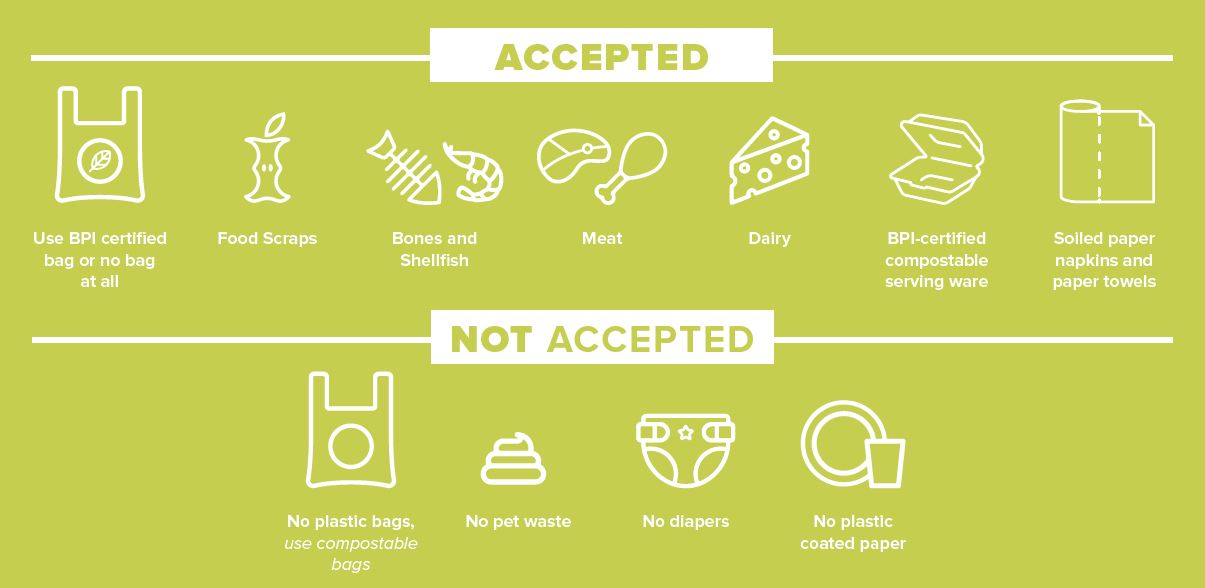Organic waste represents approximately one third of Ohio State’s total waste stream. These organic materials, like food scraps, can be converted into a soil fertilizer through composting. Learn more about what you can do to compost.
Residence Hall Student Composting
Contact recycle@osu.edu for more information.

On-Campus Residence Hall Student Composting Program
Public compost bins are available in most residence hall lobbies next to reusable to-go container collection bins, as well as in kitchen spaces. Upon returning a reusable to-go container, empty any food scraps, napkins and compostable ware into the green compost bin. Then, return your reusable to-go container. When you prepare meals in the residence hall kitchen, be sure to compost any food scraps in the nearby green compost bin.
Ohio State also offers students the opportunity to compost in their residence hall rooms. Composters who opt-in at the beginning of the semester will receive a 2.1 gallon compost bucket to collect materials in their rooms. After filling the bucket up with food scraps, napkins, paper towels and compostable containers, composters can empty their bucket in the centralized compost bins located in the residence hall.
Smith-Steeb is testing the automatic enrollment for the composting program. This year, every room in Smith-Steeb automatically is equipped with a compost mini bin at move-in. In Smith-Steeb, liners can be requested at the front desk.
How to Compost in a Residence Hall
- Request a compost mini-bin.
- You will be emailed information during the compost bin distribution week about where to pick up your composting bin and the nearest centralized collection bin.
- Place compostable materials in your bucket. The bins should have absolutely no plastic. To minimize odors and pests, consider keeping your bucket in the refrigerator and secure the lid tightly.
- Empty your bucket as soon as it fills, or at least once-per-week at the centralized drop-off sites in your building.
- Rinse your bucket in your residence hall’s kitchen sink and wipe your bucket clean as needed to prevent odors and pests. Do not empty materials or rinse in your bathroom sink, as this will cause clogs.
- Repeat steps 3-5.
Compost Drop-Off Program
Students, faculty and staff in off-campus living areas are encouraged to participate in Ohio State’s food composting program. Collect acceptable organics materials at home and bring them to one of the eight drop-off locations about once a week when you come to campus for work or class.
Kitchenette Composting
Faculty and staff can also request a compost bin for their breakroom. Breakroom compost bins are not serviced by custodial staff, so requesters must be willing to empty compost bins at least once per week into a centralized collection container.
Frequently Asked Questions
What is composting?
Composting is the process of recycling organic matter such as food scraps, leaves, and animal products into a nutrient-rich soil amendment.
What can I compost?
- Ohio State’s composting program accepts plant and animal-based products, including Food scraps, like fruits, vegetables, meat, dairy, bones, shellfish, eggshells, coffee grounds and filters.
- Plant-based materials, including food-soiled pizza boxes, napkins, paper towels, wood stirrers and chopsticks.
- Compostable serving ware, which is often labeled as compostable, BPI, #7, or “PLA”.
Where are campus drop-off points located?
- Please note: The Buckeye Parking Lot (2701 Fred Taylor Dr.) is temporarily closed during football season (August–November). Please use one of the alternative campus drop-off sites.
- Carmack Parking Lots 2, 3 (999-1049 Carmack Rd.)
- Drinko Hall (55 W. 12th Ave., near the dumpsters)
- Healthy Community Center (1600 E. Long St.)
- Printing Facility (2500 Kenny Rd., parking lot facing Waterman Farm
- Mershon Auditorium (1871 N. High St., near the dumpsters)
- Shelter House (690 Ackerman Rd).
- Postle Hall (305 West 12th Avenue, near dumpsters)
You may also view a map of composting locations online.
Why is composting important?
- Organic materials represent about one-third of what we throw away.
- Combat climate change - Composting keeps these materials out of landfills where they take up space and release methane, a potent greenhouse gas that can trap 25 times more heat in the atmosphere than carbon dioxide. Compost-amended soil also provides carbon sequestration.
- Enhance soil and protect water - Compost makes soil more resilient by improving the biological, chemical, and physical characteristics of soil. Adding compost to soil reduces the need for herbicides, pesticides, and artificial fertilizers. Compost can also immobilize and degrade toxins, preventing groundwater contamination.
- Build community and food system resilience - Composting creates more job opportunities than landfilling and slows the expansion of landfills, which replace natural ecosystems and habitats. Adding compost to soil can increase crop yields, strengthen plant resistance to parasites, and reduce irrigation needs.
How can I provide compost at an event?
Visit the Zero Waste event page for additional details.
How can I request a compost bin?
Faculty, staff, and students living on or off campus can request a compost mini-bin through this form.
My bin has fruit flies or other pests. What should I do?
Fruit flies are attracted to rotting food, whether it's in the trash or the compost bin. The key is to avoiding fruit flies is to empty the bin frequently. If fruit flies have already found your bin, empty the bin and clean it thoroughly. You will need to discontinue use of the bin temporarily until the fruit flies have dissipated. if the problem is occurring on campus, contact Service2Facilities to eliminate any pests.
To prevent fruit flies, you can make a simple fruit fly trap using apple cider vinegar and dish soap. Fill a small bowl or cup with apple cider vinegar and then mix in a few drops of dish soap. The stale sweetness of the apple cider vinegar tempts flies, and the dish soap works to decrease the surface tension of the liquid, causing the flies to become immersed immediately upon investigating the solution and unable to escape. Do not resume compost collection until the flies have disappeared. Then, be sure to empty your bin more often to prevent future issues.
If I compost in my residence hall room, what are the expectations for participation?
- Adhere to the strict guidelines of placing only the acceptable compostable items outline in the “What to Compost” sticker provided on the front of the bucket.
- Deliver compostable items in the collection bucket to the designated drop-off location weekly.
- Manage the compost bucket to minimize pests and odors.
- Ensure the compost bucket is empty and clean during any extended absence (ie. winter break, spring break).
Where is the organic waste processed?
Ohio State collaborates with the Ohio Department of Rehabilitation (ODRC) and Correction and Ohio Penal Industries, who operates a recycling sorting program and Class II compost facility in London, OH, as a workforce and reentry training program. Our collaboration with ODRC and OPI is focused on sustainability, education and rehabilitation. Through this collaboration, Ohio State football gameday recycling is sorted and some campus organic waste is composted at the facility, while participants earn a $10.45 per hour wage (with increased overtime wage rates when applicable), learn several trade skills, and can earn composting certifications through the university’s College of Food, Agricultural, and Environmental Sciences and additional training through Ohio State Extension. In addition, individuals are eligible to earn credit towards early release through their participation.
Can I request a second compost mini-bin?
Yes. Students living on campus are able to request up to 1 bin per 2 people in their residence hall room. Faculty/staff may also request a second bin if you wish to have a bin for home and office kitchenette use. You may also request a replacement bin if your compost mini-bin has become damaged.
Compost Education Volunteer Opportunities
- Want to help reduce food waste at Ohio State? You can educate other students about composting at key campus locations while earning community service hours, developing leadership skills, and gaining sustainability experience.
- All volunteers will receive a free t-shirt. Students who volunteer 5 hours will receive a reusable utensil set, while students who volunteer 10 hours will earn a free Hydroflask.
- Volunteers must attend a short training and sign up to teach peers how to compost and why it's important. Sign up at go.osu.edu/compostvolunteer.
